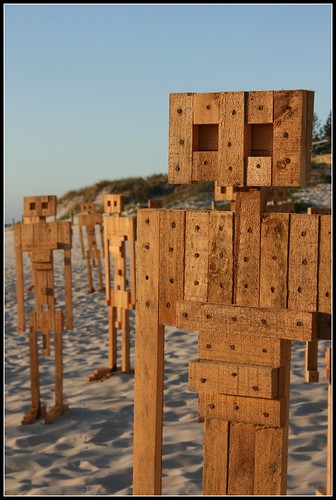Home » personal (Page 4)
Category Archives: personal
Sculpture by the Sea – Cottesloe 2008
Last night Emily and I enjoyed the 2008 installations for Sculpture by the Sea which is in its final few days this year. For those of you unfamiliar, this wonderful annual effort sees one of Perth’s best beaches suddenly populated with all manner of installation art and sculptures for a couple of weeks – it’s always a great event which really does mix art and beach culture in a really engaging way. While I didn’t take that many pictures list year (unlike 2007 where I went a little nuts!), you can find a few more photos of this years sculptures on Flickr.
Anyone in Perth who hasn’t made it down to Cottesloe yet, tomorrow (18 March) is the last official day, so get your skates on!
R18+ Category for Video Games In Australia (The Saga Continues)
Australia has once again got an R18+ category for videogames on the discussion table. However, as Asher Moses reports in The Age:
In the gaming community at least, South Australian Attorney-General Michael Atkinson has become the Darth Vader of politics with his opposition to R18+ ratings for games. But Mr Atkinson insists his forceful opposition is to protect children from “harmful material”. Australia is the only developed country without an R18+ classification for games, meaning any titles that do not meet the MA15+ standard – such as those with excessive violence or sexual content – are simply banned from sale by the Classification Board.
Any changes to the censorship regime must be agreed on by the Commonwealth and all state and territory attorneys-general. For the first time since November 2005, the issue will be discussed later this month at the Standing Committee of Attorneys-General, but Atkinson has confirmed he will maintain his long-running opposition to the idea. […] In a speech in South Australia’s State Parliament yesterday, during which Atkinson was forced to return to his seat after being cut off by interjections, he acknowledged blocking the R18+ rating would deny adults choice. But he said this was necessary as the alternative would allow children easy access to “potentially harmful material”. “Games may pose a far greater problem than other media – particularly films – because their interactive nature could exacerbate their impact,” he said. “The risk of interactivity on players of computer games with highly violent content is increased aggressive behaviour.”
I’ve long been a proponent for the R18+ rating for video games in Australia and now that it’s in sight once again, I’m really troubled that one man – Michael Atkinson – could stand in the way. Let me just reiterate why the R18+ category is important:
- The majority of video game players in Australia are adults and thus deserve the right to decide for themselves what games they’ll play.
- Banning video games increases their notoriety, making them more appealing to kids and teenagers, meaning that they are far more likely to download them illegally or purchase them in or from another country.
- Part of the argument against the R18+ category seems to be a presumption that Australia’s current ratings system for film, tv, etc., isn’t effective. If the ratings system is broken, focus on fixing that, not blanket bans on whole sections of a medium!
- There is no substantial evidence that violent video games cause violent behaviour. (There are small-scale studies which see some increase in violent thoughts (not actions: thoughts), but there are an equal number of studies that show no correlation. A lot more research and study here would help! Personally, I’m reminded that at the beginning of the twentieth century books were being banned for corrupting the moral fibre of society; in the 1950s and 60s rock music had similar charges levelled against it!
- Interactive doesn’t equal addictive, nor does it dull the critical senses of players. If someone can’t distinguish between games and everyday life, the there’s a lot more to worry about than the games.
While The Age and other reports are supposedly trying to be neutral in their reporting, I suspect from the last few lines of Moses’ report on the issue, his sympathies are with those arguing for the R18+ category, too:
Research conducted by Bond University in Queensland for the IEAA found that the average age of Australian gamers is 28 and over 50 per cent of gamers are over 18.
Another survey of 1601 Australian households, conducted by the university in 2005, found 88 per cent of Australians supported an R18+ classification for games.
“From what I’m hearing the majority don’t seem to be opposing the R18+ [rating for games], so i’d be interested in what constituency he (Atkinson) is fighting this cause for,” [Ron] Curry [CEO of the games industry body, the Interactive Entertainment Association of Australia (IEAA)] said.
Logan Booker, editor of the gaming blog Kotaku Australia, said that ultimately parents, and not the government, should be the ones take responsibility for restricting what games their kids play.
“The UK, Europe and the US seem to handle an R18+ rating just fine, isn’t Australia mature enough to cope as well?”
Mars
Over the last month or so I’ve been slowly re-reading Kim Stanley Robinson’s epic Mars trilogy; I’m a little way into the second book (Green Mars), but my head is still full of the magnificent world-building that Robinson manages in the first installment, Red Mars. Also, oddly enough, I’ve been fascinated by the way that the way that the plotting in Red Mars – which uses flash-forwards, flashbacks and other jumps – is similar to the way the TV series Lost works. There are parallels, too, between the First Hundred (the first human colonists on Mars) and the survivors of Oceanic 815 (in Lost) in terms of the way their lives are ruled by the geographic isolation and unexpected challenges of territories unknown.
More to the point, with the vivid descriptions of Mars conjured by Robinson freshly in mind, I was really struck by a report which highlighted the fact that the High Resolution Imaging Science Experiment (HiRISE) has managed to capture images of an avalanche taking place on the surface of Mars!
These images really do capture the imagination. Although Mars is often considered close to a dead planet, burnt out and inactive, looking at these amazing photos really does remind me that our closest planetary neighbour holds many mysteries and far from satisfying my desire to know more, these images tantalise the imagination, and make me wonder what other stories the dusty red planet has to tell. [Via io9]
Sorry

Saying sorry to the Stolen Generations isn’t the solution, but it is the beginning of a solution. Like Jean, I choose to be optimistic that this apology is an important and substantial step in the right direction for all Australians.
Update: Kevin Rudd has said sorry on behalf of all Australians, which is long overdue and most welcome. You can read the apology or watch it here.
[Photo by Spud Murphy]
Still bubbling …
While it hasn’t really been a conscious decision, I seem to have taken a rather extended break from blogging without really intending to do so. After my last six posts were just annotated del.icio.us links I did think I should make sure the next post has a little more substance, but you’re getting this instead. Really, I just thought I should check in and say I’m alive and well, just very busy. In January this year I returned to the Communication Studies discipline here at UWA and am finally getting my head around the new position, as well as all my new teaching commitments. It has also been one of the hottest summers I can remember which really doesn’t make for any more time behind the computer screen that is absolutely necessary!
I do intend to get back into blogging properly soon. Toward the end of last year I think I had a bit of blog lethargy plus a considerable information overload. I’ve now scaled back my Twitter network to 1/4 it’s original size. I also read Jean’s post on leaving Facebook and seriously considered it (yes, as Axel lamented last year, my closed network is getting more attention that my open ones), but there are just too many people who communicate through Facebook that I would find it too hard right now to let those connections fizzle away. That said, as I will have been blogging for five years this May, perhaps a little break was due, anyway. However, I guess if the WGA are getting back to writing, I should try to as well!
More soon … ish.
Archiving and Commenting
As of last month, this blog is now being archived by the National Library of Australia and can thus be found in Pandora – Australia’s Web Archive. I’m pleased that this blog has become a little less ephemeral, but I also thought given that the archiving process makes not only content from my but also comments much more lasting, it might be worth informing those who engage here through comments that these comments are also likely to stand the test of time more rigorously! Also, I figured a comment policy might now be appropriate – this will also appear on the About page – but is initially posted here to make sure everyone’s informed:
Comment Policy
Meaningful comments are encouraged. Posting comments using a real name and with a link back to a real website are encouraged, but not necessary. Conversation, community and criticism are valued here. Debate is also welcome – arbitrary rudeness is not. As the blog owner and author, I maintain the right to delete comments which I deem to be rude and outside of meaningful conversation (I vastly prefer not to delete comments, but retain that right).
Also, this blog is protected by spam filters which means there many be a delay between comments being posted and them appearing in the blog. If a genuine comment has not appeared within a couple of days, please email me and I’ll check if it’s stuck in a spam folder.
Any comments on the comments policy are, of course, welcome!
Learning Futures: Day One Insights
I’m at the Learning Futures Symposium today and tomorrow. I’m not blogging summaries of sessions because, to be fair, that’s often quite dull. However, I thought I’d take the opportunity to take the conference discussions to springboard some observations or thoughts that occurred during these interactions…
Insight #1: There is a reasonable amount of critical distance in terms of the ‘digital natives/digital immigrants’ rhetoric, but the same critical perspective doesn’t stretch to critiquing the idea of ‘web 2.0’. Whereas ideas which supposedly encompass an entire generation are easy enough to pull apart, many educators seem wary of software and claims made about software as they acutely feel that this is one of the few areas in which students know more about this area than they do. I suspect that if the same educators were dipping their toes in a little more they’d realise something commonsensical which seems to have entirely escaped these kind of conversations: that while there are many types of web 2.0 software, there are generic skills to be found in using these tools and platforms. The reason that people can move from Friendster to MySpace to Facebook so easily, for example, is that at a basic level there is a lot of similarity between the way these platforms operate and the skills needed to use them. Sure, the rate of new names of software can be overwhelming, but if we remember that a large section of the skills learnt using one social software platform are viable for the next, super-duper, upcoming must-have web 2.0 tool are transferable, that makes taking the time to learn and teach them a whole lot more important and palatable. And social software platforms are just one example; skills in blogging, using wikis and many other forms of ‘web 2.0’ tools are similarly transferable and, at some level, generic. Perhaps we should be focusing more on what those skills are.
Insight #2: Often the people in the driving position for educational policy aren’t confident to make decisions about ICT – nor should they be!
It’s Going to be a BIG September!
I’m attending four conferences or symposia across the next four weeks. In a perfect world, each will come with details blogging; however, if I don’t get around to writing much for a few weeks, here’s why …
[X] Learning Futures Symposium – 10 & 11 September, Canberra – This is a two-day symposium held at ANU looking at the changing shape of education, pedagogy and learning in general in the face of changes brought on by digital communication under the web2.0 umbrella. The programme (pdf) looks pretty interesting, with showcases of Australian social software educational efforts and some great sessions which are more centred around conversations than too many formal presentations.
[X] Thinking Society, Thinking Culture – 13 & 14 September, Perth – This is an interdisciplinary forum organised by the Institute for Advanced Studies at UWA with the aim of bringing WA’s many academics, researchers, artists across the range of historical and cultural studies, and other social sciences, together the share their work and build fruitful interdisciplinary networks and exchanges. I’m giving my paper “‘We’re sorry, but the clip you selected isn’t available from your location’: Watching Battlestar Galactica in Australia and the Tyranny of Digital Distance” in ‘A Digital World’ session which takes place on Friday, 14 September starting at 10.30; this panel will also feature Toby Burrows talking about ‘e-Research and the Humanities: Current Directions’, Ethan Blue talking about ‘Prison Medical Photography in Early 20th-Century California’ and Jeremy Blank speaking on ‘Past,Present,Futures:Integrating practice in Visual Art studies’.
The keynote is being delivered on Thursday (13th) evening by Ross Gibson from UTS talking on “The Aesthetics of Repletion“; this talk is open to the public, so if you’re in Perth, come along!
[X] PerthDAC – Digital Arts & Culture – 15 to 18 September, Also Perth – DAC has a history of being at the cutting edge of digital arts and media studies and this year looks to be no exception. There’s lots to look forward to, from talks on blogs in education to Axel Bruns on produsage to a host of key names in game studies talking about everything from Second Life to the Wii. DAC is concurrent with BEAP (the Biennale of Electronic Arts Perth) so the theory of DAC will mix with the performance and exhibitions of the latest in digital art which will no doubt be a very rich and exciting four days!
[X] The Australian Blogging Conference – 28 September, Brisbane (Free!)- Sessions will include The Politics of Blogging; Researching Blogging; Blogs, Creativity and Creative Commons; Legal Issues; Citizen Journalism, Blogs and Education; Business and Corporate Blogging; and Building a Better Blog. I’ll be facilitating part of the Blogs and Education session, although I’m not sure how many people will be there since I suspect the concurrent Citizen Journalism session, which includes a focus on YouDecide2007, might prove quite a draw-card. That said, Blogging in Education is certainly fun to talk about and there’s a lot going on in the world of edublogging, so I trust we’ll have some great exchanges in our session, too! To see who’s already confirmed they’re attending, click here; that list will grow substantially across the next few weeks, I suspect!
I’m also chuffed it’s September because that means Jill Walker Rettberg will be joining us at UWA for the month! And let’s not forget that October will also include Australia’s first Podcamp which will also be held in Perth!
Off the Grid!
I’m on leave, and Emily and I are away, until August 24th. More to the point, we’re going to be completely without internet connectivity (partially by choice, more by circumstance), so I’m going to be completely off the grid until we get back to Perth. So, please don’t take offence if emails go unanswered or moderated comments don’t appear in the meantime … I’ll get to most stuff within a couple of days after August 24th. Until then, enjoy this little picture I took of a little memento from our honeymoon …
The image shows a few rocks and pebbles that made their way from a park in Venice to our bedroom in Perth!
Talking Facebook, MySpace, Australian Politics and Class … on the radio
Yesterday I was interviewed by Laura Miller on RTR FM’s radio programme ‘Morning Magazine’. Laura and I spoke about about MySpace, Facebook, Australian politican’s using social software, and the recent interest in these spaces in terms of ‘class’ on the back of danah boyd’s work. For the two or three people in the world who would be interested in hearing me talk about these things, you can listed to an mp3 recording of the interview (which clocks in at just under 10 minutes) here.
Incidentally, Laura completed her Communication Studies degree at UWA last year and was part of a team who put together the wonderful comic exploration of the role of the Peacock’s at UWA and that video is viewable here (fans of Laura’s may want to focus around 2:18 in, which features a 1970s Laura cameo!).





